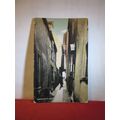Portmeirion, Gwynedd - Hotel - Dixon postcard c.1960s
- Condition : Used
- Dispatch : 2 Days
- Brand : None
- ID# : 207187704
- Quantity : 1 item
- Views : 189
- Location : United Kingdom

- Seller : justthebook (+1703)
- Barcode : None
- Start : Wed 02 Mar 2022 10:38:13 (BST)
- Close : Run Until Sold
- Remain : Run Until Sold
More Listings from This Seller view all
Seller's Description
- Postcard
- Picture / Image: Portmeirion Hotel, Merioneth [now in Gwynedd]
- Publisher: J Arthur Dixon (Wales 7202)
- Postally used: no
- Stamp: n/a
- Postmark(s): n/a
- Sent to: n/a
- Notes / condition:
Please ask if you need any other information and I will do the best I can to answer.
Image may be low res for illustrative purposes - if you need a higher definition image then please contact me and I may be able to send one. No cards have been trimmed (unless stated).
------------------------------------------------
Postage & Packing:
Postage and packing charge should be showing for your location (contact if not sure).
No additional charges for more than one postcard. You can buy as many postcards from me as you like and you will just pay the fee above once. Please wait for combined invoice. (If buying postcards with other things such as books, please contact or wait for invoice before paying).
Payment Methods:
UK and all other locations - PayPal or other methods listed above.
NOTE: All postcards are sent in brand new stiffened envelopes which I have bought for the task. These are specially made to protect postcards and you may be able to re-use them.
I will give a full refund if you are not fully satisfied with the postcard.
----------------------------------------------
Text from the free encyclopedia WIKIPEDIA may appear below to give a little background information (internal links may not work) :
*************
Portmeirion is a tourist village in Gwynedd, North Wales. It was designed and built by Sir Clough Williams-Ellis between 1925 and 1975 in the style of an Italian village, and is now owned by a charitable trust. The village is located in the community of Penrhyndeudraeth, on the estuary of the River Dwyryd, 2 miles (3.2 km) south east of Porthmadog, and 1 mile (1.6 km) from Minffordd railway station. Portmeirion has served as the location for numerous films and television shows, most famously as "The Village" in the 1960s television show The Prisoner.
Sir Clough Williams-Ellis, Portmeirion's architect, denied repeated claims that the design was based on the fishing village of Portofino on the Italian Riviera. He stated only that he wanted to pay tribute to the atmosphere of the Mediterranean. He did, however, draw on a love of the Italian village stating, "How should I not have fallen for Portofino? Indeed, its image remained with me as an almost perfect example of the man-made adornment and use of an exquisite site."[1] Williams-Ellis designed and constructed the village between 1925 and 1975. He incorporated fragments of demolished buildings, including works by a number of other architects. Portmeirion's architectural bricolage and deliberately fanciful nostalgia have been noted as an influence on the development of postmodernism in architecture in the late 20th century.
The main building of the hotel and the cottages "White Horses", "Mermaid", and "The Salutation" had been a private estate called Aber Iâ (Welsh: Ice estuary), developed in the 1850s on the site of a late 18th-century foundry and boatyard. Williams-Ellis changed the name (which he had interpreted as "frozen mouth") to Portmeirion: "Port-" from its place on the coast; "-meirion" from the county of Merioneth (Meirionydd) in which it was sited.[2] The very minor remains of a mediaeval castle (known variously as Castell Deudraeth, Castell Gwain Goch and Castell Aber Iâ) are in the woods just outside the village, recorded by Gerald of Wales in 1188.
In 1931 Williams-Ellis bought from his uncle, Sir Osmond Williams, Bt, the Victorian crenellated mansion Castell Deudraeth with the intention of incorporating it into the Portmeirion hotel complex, but the intervention of the war and other problems prevented this. Williams-Ellis had always considered the Castell to be “the largest and most imposing single building on the Portmeirion Estate" and sought ways to incorporate it. Eventually, with support from the Heritage Lottery Fund and the European Regional Development Fund as well as the Wales Tourist Board, his original aims were achieved and Castell Deudraeth was opened as an 11 bedroom hotel and restaurant on 20 August 2001, 23 years after Williams-Ellis's death, by the Welsh opera singer Bryn Terfel.
Listing Information
| Listing Type | Gallery Listing |
| Listing ID# | 207187704 |
| Start Time | Wed 02 Mar 2022 10:38:13 (BST) |
| Close Time | Run Until Sold |
| Starting Bid | Fixed Price (no bidding) |
| Item Condition | Used |
| Bids | 0 |
| Views | 189 |
| Dispatch Time | 2 Days |
| Quantity | 1 |
| Location | United Kingdom |
| Auto Extend | No |




 for 1 item(s)
for 1 item(s)

















